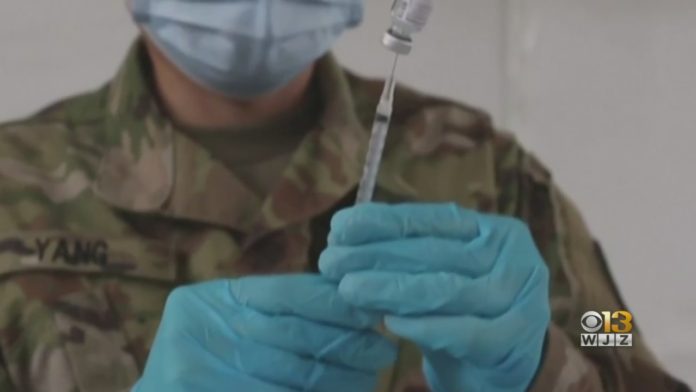
The Telegraph
‘I’m pregnant, in my 40s and nobody will give me a Covid vaccine’
As a pregnant soon-to-turn-44-year-old, I was reassured to hear the news in mid-April that pregnant women in the UK would be offered the Pfizer-BioNTech or Moderna vaccines in their age-related cohorts. Then last week The Joint Committee on Vaccination and Immunisation (JCVI) advised that all adults aged 18-39 should be offered an alternative to the Oxford/AstraZeneca vaccine once they become eligible for vaccination. However, what I and many other pregnant women have been discovering in recent weeks, is that actually following the JCVI’s recommendation to select a Pfizer or Moderna vaccine is proving extremely difficult thanks to a gaping divide between government advice and implementation. When I received a text saying I was eligible for my vaccine two weeks ago, I followed the advice given to pregnant women and contacted my GP. The response there was that I could not “pick and choose my vaccine” and “would have to get what I was given”. I tried calling the 119 Covid line next, only to be told pregnant women shouldn’t be vaccinated at all. After reading the updated information, I was told the system wouldn’t allow me to select a particular type of vaccine but I was welcome to book a jab and “see if I got lucky”. My next port of call, the maternity day care unit, advised me to contact my obstetrician, who recounted some dire risks posed by Covid-19 to pregnant women, particularly those in later gestation, and urged me to get a vaccine – “whichever one you can get your hands on”. When I mentioned the current advice to request the Pfizer or Moderna vaccines, the response was: “Well, you clearly know more than me, so go for whatever you think is best.” Unfortunately, this jumbled response to pregnant women currently trying to secure a vaccine is by no means rare. The campaign group Pregnant Then Screwed and Royal College of Obstetricians and Gynaecologists (RCOG) have been inundated with similar tales from women across the country. Joeli Brearly, founder of Pregnant Then Screwed, says: “The government has suffered from a baby blind spot throughout this pandemic and I believe it is negligible to issue advice to pregnant women without having the mechanisms in place to implement them.” In a global pandemic where pregnant women have felt consistently marginalised, a vaccine data void has left many feeling scared, ill-informed and vulnerable. These fears are not unfounded: research from global studies has shown that pregnant women with Covid-19 are at a significantly higher risk of hospitalisation and severe disease than women of the same age who are not pregnant. A recent study, analysed by a team of international scientists from the University of Oxford and published on the JAMA Paediatrics Network, further confirmed that pregnant women with Covid-19 had a 76 per cent higher risk of contracting preeclampsia, a medical condition that causes blood pressure to rise, and that 59 per cent were more likely to give birth prematurely, requiring their newborns to spend time in neonatal intensive care units. These studies, and others like them, have convinced many clinicians that pregnant women should be prioritized for Covid-19 vaccines. However, because early vaccine trials excluded pregnant women, safety monitoring data is limited to a study of around 90,000 pregnant women vaccinated in the US with mainly mRNA vaccines, including Pfizer-and Moderna. When no safety concerns were raised amongst this group, the JCVI advised on April 17 that: “It’s preferable for pregnant women in the UK to be offered the Pfizer-BioNTech or Moderna vaccines where available.” In its announcement, the JCVI listed several actions to be implemented to the National Booking System and at vaccination sites to enable eligible pregnant women to book a vaccination in line with the latest clinical guidance. With the exception of the point that “vaccination sites should first look to vaccinate eligible pregnant women with Pfizer-BioNtech through excess supply for second dose clinics”, it sounded promising. Unfortunately, the reality is proving to be anything but. Brearly has been campaigning together with the RCOG and Labour MP Stella Creasy to raise awareness of the disconnect between the current vaccine advice for pregnant women and the infrastructure to enable them to follow it. Dr Pat O’Brien, vice president at the RCOG, confirms: “We are working on two primary issues here: addressing the logistical challenges presented surrounding the latest advice and educating clinicians about the rapidly-changing advice regarding pregnancy and Covid-19.” The education of GPs, obstetricians, midwives and, ultimately, the public is a source of concern for Brearly as well. “An information vacuum has been allowed to form around the safety of Covid-19 vaccines in pregnancy, which has been filled by misinformation. Women are hearing stories about vaccines leading to miscarriage, stillbirths and infertility and the lack of consistent advice from health professionals is doing little to dispel their fears.” Regarding the logistical challenges of enabling people to follow the latest JCVI advice, Dr O’Brien is confident that the government is “working hard behind the scenes”. Yet in a joint statement issued by the RCOG and Royal College of Midwives on May 7, Mary Ross-Davie, Director of Professional Midwifery at the Royal College of Midwives (RCM), confirmed: “The NHS online booking system in England is letting down pregnant women, causing understandable anxiety and frustration. The speed of the rollout for the vaccine has been world-leading, but it needs the systems in place to keep pace. It’s distressing to hear of pregnant women being unable to access a vaccine centre that carries either the Pfizer-BioNtech or Moderna vaccine. That is not acceptable.” Ross-Davie’s frustration is shared by MP Stella Creasy, who has been campaigning to highlight the difficulties experienced by pregnant women in their 40s (like herself) and helping those in her constituency of Walthamstow to receive vaccines. “Ministers keep assuring me that something will happen,” explains Creasy. “But currently it seems that pregnant women either need a grumpy MP or a really dynamic doctor to secure a vaccine.” Creasy attributes the situation to a combination of complacency, logistical barriers and a lack of data sharing between hospitals, GPs and midwives, granting that “there’s some politics behind it too”. She goes on to say: “The significant risk to pregnant women, particularly those in later gestation, simply isn’t being taken into account. In addition to the pregnant women in their 40s currently fighting for their vaccine there’s a backlog of clinically vulnerable women who were initially deemed ineligible for the vaccine because they were pregnant who are also fighting to be vaccinated.” In lieu of a grumpy MP or dynamic doctor, I’ll keep chipping away at the system to get my jab. And I’ll keep hoping that someone might address the glaring baby blind spot that threatens to blight an otherwise exemplary vaccination programme.








